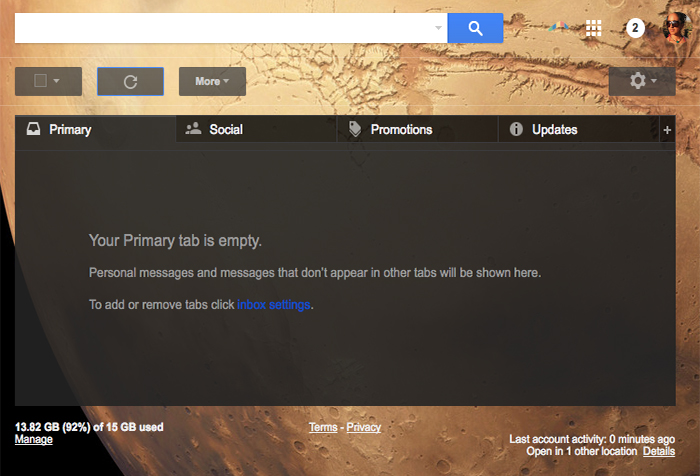
You should see my Inbox after I’ve left it unchecked for a few days.
The sheer volume of crappy pitches, press releases, “check out my infographic” and “could you link to us?” requests would make your head explode.
I leave my Inbox untamed for 2-8 days stretches on a semi-regular basis, and when I return, I discover that my Inbox has devolved into a feral, rabid animal, foaming at the mouth with spammy solicitations.
A few years ago, in an effort to battle this wildebeest, I attended a conference presentation about Inbox management. (Yeah, I’m lots of fun at parties.) The advice I heard nearly killed me.
“Whenever somebody sends you a pitch,” the panelist said, “reply back. Start a conversation with the sender. You never know where that connection might lead.”
That’s one of the worst recommendations I’ve ever heard.
Please do me a favor.
If someone tells you to invest your two most valuable assets — time and energy — into an activity because “you never know where it might lead,” run away from the room and vomit. Then get some ice cream.
How often have you heard this advice?:
- Go to every networking event on the planet!
- Jump on every new social media platform!
- Hand out your business card to everyone!
- Reply to every email/tweet/message/comment that comes through!
The justification is always the same: “You never know where it might lead.”
Let’s rephrase that, shall we?
“You never know” is a euphemism for, “this might perhaps possibly potentially offer a tiny theoretical incidental incremental benefit. Maybe.”
Wow. What a barometer.
(Psst! You might want to raise your standards.)
Sure, if you’re trying to save money, you might benefit from melting your soap slivers in the microwave, until they recombine into a disappointing soap bar of sadness.
And sure, if you’re trying to grow an online business, you might benefit from a time-consuming attempt to tweet, pin, gram, snap and scope your way to success.
But the potential for any benefit is not a sufficient reason to devote yourself to an activity. You’re not looking for any benefit, you’re looking for 10x results.
10x thinking can catapult you from “meh” to “whoa!!” in absurdly-small increments of time. The old establishment rules of thumb — that you need to “pay your dues” or “put in your time;” that you need to spin your wheels for 10,000 hours or work in a crappy cubicle for 40 years — disappear when you embrace 10x thinking.
Imagine that you want to retire in 10 to 15 years. Should you spend your time:
- Learning how to invest?
- Doubling your income?
- Building a side business?
- Blasting your limiting beliefs?
Or should you spend your time:
- Coupon clipping?
- Saving the wax from melted candles?
- Obsessively opening/closing bank accounts for sign-up bonuses?
- Stacking rebates on top of gift cards on top of promo codes on top of cash back rewards?
- Sewing fabric scraps into holiday wreaths? (Just kill me. Please.)
Sure, coupon-clipping offers a slight marginal benefit. You’ll save $4 on a stick of butter.
But at what cost?
The ‘Any Benefit’ Fallacy
Cal Newport, the author of Deep Work (which I highly recommend) and a recent guest on my podcast (which I also recommend!), says its absurd to chase any incremental benefit. He says we need a higher bar:
“If you’re not helping me become world class, then get the hell out of my way.”
Most woodworking tools offer some benefit. You can’t buy them all. So a master craftsman doesn’t ask, “is there any benefit to buying that woodworking tool?,” Newport says. A master craftsman asks, “what few tools create outsized results?”
Farmers can’t buy every machine, he says; they carefully choose the few tools that’ll maximize results.
Likewise, office workers need to curate, not accumulate.
- Facebook?
- Snapchat?
- Checking email obsessively?
These digital distractions have hidden costs on our time and attention.
Extreme frugality can also take its toll.
- Dumpster diving?
- Cutting your internet?
- Melting your soap slivers?
Too many people apply the “any benefit” mentality to their finances. They busy themselves with penny-pinching (which offers the psychological victory of easy wins) rather than build sustainable, long-term investments. They’ll lose the war to win the battle.
One blogger wrote:
“I’d happily spend an hour or two trying out a new tactic if it meant I would spend $0.50 less a month with no additional effort.”
Seriously? Are you kidding? After two years, $0.50 per month will accumulate into $12. What league are you competing in?
If your goal is to retire at 40, wouldn’t you accelerate success by learning how to invest rather than shopping for socks at yard sales?
“But Paula, why can’t I do both? Why not clip coupons AND shop yard sales AND start the next SpaceX?”
Because life is not an endless series of “ands.” You can do anything, but not everything. Every decision is a trade-off against something else. By letting go of tiny tweaking, you leave space in your life for mind-blowing results.
Here’s a better approach, in two steps:
#1: Subtract stuff that’s unnecessary.
#2: Add stuff that’ll pose a significant benefit at a slight marginal cost.
You’re welcome.
How to Separate Worthwhile vs. Wasteful
Better questions yield better answers. So ask yourself: How can I separate what’s worthwhile vs. a waste of time?
Try this:
Step #1: Write a five-year goal. For example:
- I earn $45,000 per year in passive income.
- I run a company with $1 million in annual revenue.
- I manage a nonprofit, no-kill animal shelter with capacity for 25 dogs and 40 cats.
Four tips to help you craft this vision:
- Write in the present tense — “I earn,” “I manage,” “I run.”
- Focus your goal into one sentence.
- Shoot for specific numbers.
- Read this aloud daily (in present tense). Your mind will believe its a foregone conclusion.
Step #2: Judge every activity by a single question: “Is [X] the most important step I can take towards my 5-year goal?”
The key words are “most important.”
- If you could only do ONE thing to achieve your 5-year goal, what would it be?
- If you could only work for 30 minutes daily towards your 5-year goal, what would you do?
- Double your 5-year goal. Can [X] still drive those results?
Let’s apply this to a few examples:
Goal: “I earn $45,000 per year in passive income.”
- Yes: Building businesses and investments.
- No: Making your own laundry detergent.
Goal: “My business earns $1 million per year.”
- Yes: Hiring talented people.
- No: Handling everything yourself.
Goal: “I own five rental properties.”
- Yes: Learning how to analyze investments.
- No: Listening to Cousin Billy speculate about houses that “might go up in value!”
As you get closer to your goals, you’ll find fun, easy distractions along the way. They’ll sing the siren call of sunshine and short-term wins. They’re tempting. But they’re distractions.
Don’t say “yes” to everything. Forget about chasing ‘any benefit.’ Focus on the few actions that’ll fast-track your results.
